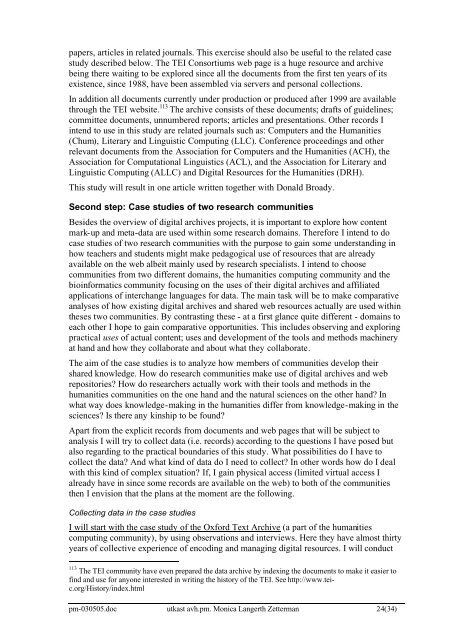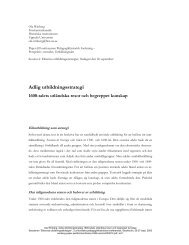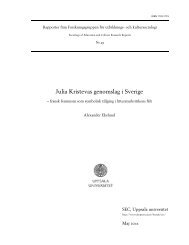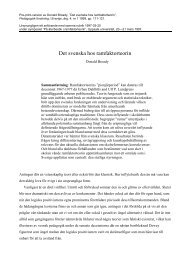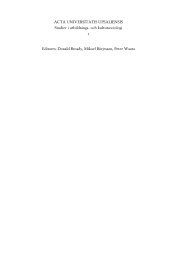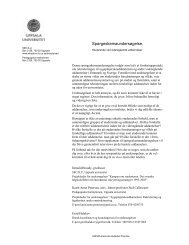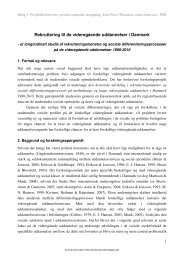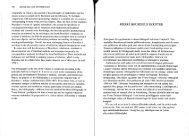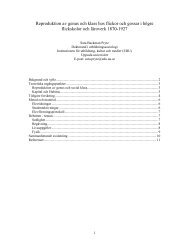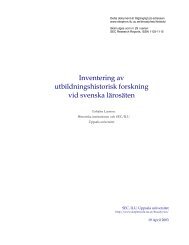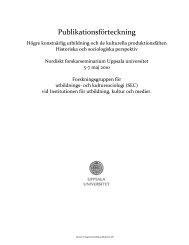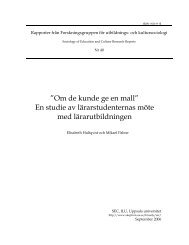exploring uses of digital archives in research and ... - skeptron.uu.se
exploring uses of digital archives in research and ... - skeptron.uu.se
exploring uses of digital archives in research and ... - skeptron.uu.se
You also want an ePaper? Increase the reach of your titles
YUMPU automatically turns print PDFs into web optimized ePapers that Google loves.
papers, articles <strong>in</strong> related journals. This exerci<strong>se</strong> should also be u<strong>se</strong>ful to the related ca<strong>se</strong>study described below. The TEI Consortiums web page is a huge resource <strong>and</strong> archivebe<strong>in</strong>g there wait<strong>in</strong>g to be explored s<strong>in</strong>ce all the documents from the first ten years <strong>of</strong> it<strong>se</strong>xistence, s<strong>in</strong>ce 1988, have been as<strong>se</strong>mbled via <strong>se</strong>rvers <strong>and</strong> personal collections.In addition all documents currently under production or produced after 1999 are availablethrough the TEI website. 113 The archive consists <strong>of</strong> the<strong>se</strong> documents; drafts <strong>of</strong> guidel<strong>in</strong>es;committee documents, unnumbered reports; articles <strong>and</strong> pre<strong>se</strong>ntations. Other records I<strong>in</strong>tend to u<strong>se</strong> <strong>in</strong> this study are related journals such as: Computers <strong>and</strong> the Humanities(Chum), Literary <strong>and</strong> L<strong>in</strong>guistic Comput<strong>in</strong>g (LLC). Conference proceed<strong>in</strong>gs <strong>and</strong> otherrelevant documents from the Association for Computers <strong>and</strong> the Humanities (ACH), theAssociation for Computational L<strong>in</strong>guistics (ACL), <strong>and</strong> the Association for Literary <strong>and</strong>L<strong>in</strong>guistic Comput<strong>in</strong>g (ALLC) <strong>and</strong> Digital Resources for the Humanities (DRH).This study will result <strong>in</strong> one article written together with Donald Broady.Second step: Ca<strong>se</strong> studies <strong>of</strong> two <strong>re<strong>se</strong>arch</strong> communitiesBesides the overview <strong>of</strong> <strong>digital</strong> <strong>archives</strong> projects, it is important to explore how contentmark-up <strong>and</strong> meta-data are u<strong>se</strong>d with<strong>in</strong> some <strong>re<strong>se</strong>arch</strong> doma<strong>in</strong>s. Therefore I <strong>in</strong>tend to doca<strong>se</strong> studies <strong>of</strong> two <strong>re<strong>se</strong>arch</strong> communities with the purpo<strong>se</strong> to ga<strong>in</strong> some underst<strong>and</strong><strong>in</strong>g <strong>in</strong>how teachers <strong>and</strong> students might make pedagogical u<strong>se</strong> <strong>of</strong> resources that are alreadyavailable on the web albeit ma<strong>in</strong>ly u<strong>se</strong>d by <strong>re<strong>se</strong>arch</strong> specialists. I <strong>in</strong>tend to choo<strong>se</strong>communities from two different doma<strong>in</strong>s, the humanities comput<strong>in</strong>g community <strong>and</strong> thebio<strong>in</strong>formatics community focus<strong>in</strong>g on the <strong>u<strong>se</strong>s</strong> <strong>of</strong> their <strong>digital</strong> <strong>archives</strong> <strong>and</strong> affiliatedapplications <strong>of</strong> <strong>in</strong>terchange languages for data. The ma<strong>in</strong> task will be to make comparativeanaly<strong>se</strong>s <strong>of</strong> how exist<strong>in</strong>g <strong>digital</strong> <strong>archives</strong> <strong>and</strong> shared web resources actually are u<strong>se</strong>d with<strong>in</strong>the<strong>se</strong>s two communities. By contrast<strong>in</strong>g the<strong>se</strong> - at a first glance quite different - doma<strong>in</strong>s toeach other I hope to ga<strong>in</strong> comparative opportunities. This <strong>in</strong>cludes ob<strong>se</strong>rv<strong>in</strong>g <strong>and</strong> <strong>explor<strong>in</strong>g</strong>practical <strong>u<strong>se</strong>s</strong> <strong>of</strong> actual content; <strong>u<strong>se</strong>s</strong> <strong>and</strong> development <strong>of</strong> the tools <strong>and</strong> methods mach<strong>in</strong>eryat h<strong>and</strong> <strong>and</strong> how they collaborate <strong>and</strong> about what they collaborate.The aim <strong>of</strong> the ca<strong>se</strong> studies is to analyze how members <strong>of</strong> communities develop theirshared knowledge. How do <strong>re<strong>se</strong>arch</strong> communities make u<strong>se</strong> <strong>of</strong> <strong>digital</strong> <strong>archives</strong> <strong>and</strong> webrepositories? How do <strong>re<strong>se</strong>arch</strong>ers actually work with their tools <strong>and</strong> methods <strong>in</strong> thehumanities communities on the one h<strong>and</strong> <strong>and</strong> the natural sciences on the other h<strong>and</strong>? Inwhat way does knowledge-mak<strong>in</strong>g <strong>in</strong> the humanities differ from knowledge-mak<strong>in</strong>g <strong>in</strong> thesciences? Is there any k<strong>in</strong>ship to be found?Apart from the explicit records from documents <strong>and</strong> web pages that will be subject toanalysis I will try to collect data (i.e. records) accord<strong>in</strong>g to the questions I have po<strong>se</strong>d butalso regard<strong>in</strong>g to the practical boundaries <strong>of</strong> this study. What possibilities do I have tocollect the data? And what k<strong>in</strong>d <strong>of</strong> data do I need to collect? In other words how do I dealwith this k<strong>in</strong>d <strong>of</strong> complex situation? If, I ga<strong>in</strong> physical access (limited virtual access Ialready have <strong>in</strong> s<strong>in</strong>ce some records are available on the web) to both <strong>of</strong> the communitiesthen I envision that the plans at the moment are the follow<strong>in</strong>g.Collect<strong>in</strong>g data <strong>in</strong> the ca<strong>se</strong> studiesI will start with the ca<strong>se</strong> study <strong>of</strong> the Oxford Text Archive (a part <strong>of</strong> the humanitiescomput<strong>in</strong>g community), by us<strong>in</strong>g ob<strong>se</strong>rvations <strong>and</strong> <strong>in</strong>terviews. Here they have almost thirtyyears <strong>of</strong> collective experience <strong>of</strong> encod<strong>in</strong>g <strong>and</strong> manag<strong>in</strong>g <strong>digital</strong> resources. I will conduct113 The TEI community have even prepared the data archive by <strong>in</strong>dex<strong>in</strong>g the documents to make it easier t<strong>of</strong><strong>in</strong>d <strong>and</strong> u<strong>se</strong> for anyone <strong>in</strong>terested <strong>in</strong> writ<strong>in</strong>g the history <strong>of</strong> the TEI. See http://www.teic.org/History/<strong>in</strong>dex.htmlpm-030505.doc utkast avh.pm. Monica Langerth Zetterman 24(34)


